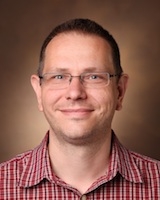
Jens Meiler, Ph.D.
- Professor of Chemistry
- Associate Professor of Pharmacology
- Associate Professor of Biomedical Informatics
- Chancellor Faculty Fellow
Phone
5144 B MRBIII
PMB 407917
465 21st Ave South
Nashville, TN 37240
PMB 407917
465 21st Ave South
Nashville, TN 37240
Jens Meiler, Ph.D.
- Professor of Chemistry
- Associate Professor of Pharmacology
- Associate Professor of Biomedical Informatics
- Chancellor Faculty Fellow
(615) 936-5662
jens.meiler@vanderbilt.edu
5144 B MRBIII
PMB 407917
465 21st Ave South
Nashville, TN 37240
PMB 407917
465 21st Ave South
Nashville, TN 37240
Research Program
Departments/Affiliations
Education
- Ph.D, Universität Frankfurt, Frankfurt, Germany (2001)
- Diploma, Universität Leipzig, Leipzig, Germany (1998)
- VorDiplom, Universität Leipzig, Leipzig, Germany (1995)


